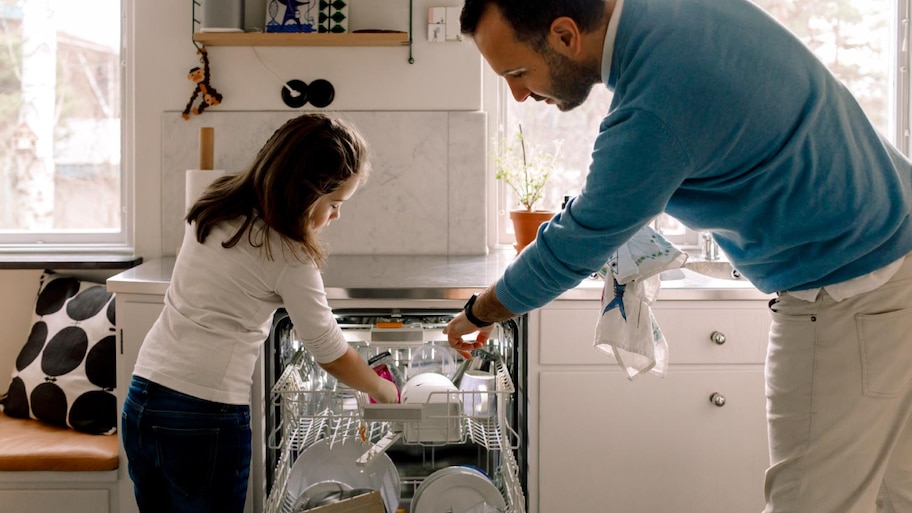Highlights
Dishwashers save significant water, energy, and time compared to handwashing dishes.
You can save up to $465 a year on water and energy bills.
Dishwashers use hotter temperatures to clean more efficiently than handwashing.
There are pros and cons to both methods, particularly in small apartments.
Automatic dishwashers have been around for more than a century, and yet there is still a debate about whether they're more efficient than handwashing dishes yourself. Sure, dishwashers have come a long way since they were first invented, but the debate has gone on longer than expected—especially with the rise of eco-conscious models.
We're here to dispel confusion once and for all: Dishwashers use less water, even if you don't have an Energy Star dishwasher. Let's compare the energy, water, time, and financial stats to clear up this debate.
Handwashing vs. Dishwasher: Stats You Need to Know

Rinsing a few dishes under the faucet and popping them on the drying rack may feel like a no-brainer. How much water and energy could you possibly use in such a short time? And does it offset the cost of installing a dishwasher?
When you compare the numbers, there's really no debate on the subject. Keep in mind that the stats below consider proper dishwasher use—which means you do not need to rinse your dishes before putting them on the rack, you only need to remove food scraps.
Water Usage
The largest discrepancies between hand dishwashing dishes and running a load in the dishwasher come down to water usage. According to The Alliance for Water Efficiency, Energy-Star dishwashers use about 3 1/2 gallons of water per cycle while older models use between 10 and 15 gallons.
While this is still quite a wide range, it is nothing compared to the amount of water used when washing dishes by hand. Kitchen faucets use between 1 1/2 and 2 gallons of water per minute, which means you'll surpass even then other dishwasher estimates with just a pile of coffee cups. On average, dishwashing uses between 9 and 27 gallons, but this widely varies based on washing methods—unlike dishwashers, which are the same every time.
Energy Usage
The Environmental Protection Agency notes that washing dishes by hand adds up to double as using the dishwasher, but there are things you can do to ensure peak performance. For example, always make sure that you run the dishwasher with a full load to get the most out of the electricity and hot water that you do need.
Energy Star dishwashers may also use special sensors and efficient jets to wash each dish as much as it needs. To save even more electricity, you can also skip the heated dry cycle. Most dishwashers use hot enough water that it will evaporate on its own once you open the door.
Cost Comparison
So how does this truly affect your wallet? Yet again, the EPA has the numbers at the ready. If you have an Energy Star dishwasher, expect to save an average of $465 a year in water and energy bills compared to washing by hand. This is yet another reason not to rinse your dishes before putting them in the machine—you would essentially offset the cost, energy, and financial savings in the process.
Since the average cost of a dishwasher and installation is $970, the machine pays for itself in two years, especially if you hire an experienced local dishwasher installer that does it right the first time.
Time Comparison
While no one loves unloading the dishwasher, it still beats the soak, scrub, and drying process necessary for the old-fashioned method. The EPA estimates a household saves 10 days a year using an efficient dishwasher compared to doing it all by hand.
Cleanliness
Even if you're thorough at soaking and scrubbing, sanitizing dishes can be tricky by hand compared to a dishwasher. Dishwashers reach temperatures between 140 and 145 degrees Fahrenheit, far hotter than even your gloved hands can manage. Throw a dirty sponge in the mix, and there's no competition against dishwashers.
Dish Safety
Here's the one place where handwashing majorly pulls ahead of the pack. Even if you run a gentle cycle, there are generally a few things you should never put in a dishwasher. High-quality knives, wooden cutting boards and utensils, non-stick pots and pans, and hand-painted glass or ceramics. For items that can't go in the dishwasher, consider soaking them before rinsing so you don't have to keep the water on too long to remove those stuck-on foods.
Handwashing vs. Dishwasher: The Pros and Cons

Let's take a moment to recap our stats and discuss some important details about the debate. After all, not all homes come equipped with a dishwasher and not everyone will opt for the more expensive Energy Star model.
Handwashing Pros and Cons
Pro: Wash delicate items without fear of damaging items
Con: Handwashing uses more water, energy, and time
Pro: You can take care of small loads quickly
Dishwasher Pros and Cons
Pro: Dishwashers save time, energy, and water
Con: They are ideal for all kitchen sizes and styles
Pro: They use hotter water and drying temperatures for better sanitation
Con: It's best to wait for a full load to run the dishwasher
Pro: Dishwashers pay for themselves in energy savings in several years
Con: Not all items are safe in the dishwasher
The Verdict

There's no question that dishwashers are an upfront investment. And over time, the cost of dishwasher repairs can creep up on you, particularly when it comes to replacing major parts. Be sure to connect with a highly rated local dishwasher repair specialist for this reason. But with its effect on the environment, savings on utility bills, and generally fewer wrinkled fingertips, a dishwasher—particularly today's modern and energy-efficient options—are the way to go.





